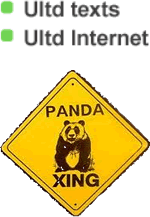
I came across the abbreviations ‘Ultd‘ today in an online add and it took me a few moments to realise that it meant unlimited. From the context it was obvious: the ad mentions Ultd texts and Ultd Internet, but without this context it wouldn’t be so obvious. Maybe they didn’t have enough space to write the word in full, but perhaps a clearer abbreviation would be unltd.
Have you come across this abbreviation before, or are there any other abbreviations that puzzle you?
Another abbreviation I’ve seen on road signs in videos and photos from Australia and the USA is Xing, meaning crossing. This puzzled me the first time I saw it, maybe because I’m not used to seeing an X used to represent the word cross. I interpreteted the word as a Mandarin Chinese one written in pinyin and wondered which of the many words with that pronunciation it was meant to be.
I was just as perplexed, if not more, when I first came across the XING abbreviation painted on a road somewhere in the USA. It looked like this, more or less, through the windscreen of the car I was in:
XING
PED
It looked to me like some kind of minor language from southern China — until I realised that whoever had it painted like that (and this seems to be standard practice) was assuming that people would first read the line closest to them as they moved ahead on the road, then the second line, slightly further away. But to me, since they both came into view at the same time save a split second, and were obviously associated, the usual habit of reading the distal/top line first automatically kicked in.
After some thought, it hit me that PED was meant to stand for “pedestrian”, and therefore XING was a cutesy way of writing “crossing”. Why not just a simple pictograph of a walking homunculus, a cross-road path, and possibly an arrow?
Although I can parse them easily enough, I was always a bit amused by signs that say “SLOW SCHOOL”.
Only barely related but for what it’s worth I hate it when people use abbreviations that aren’t extremely common without explaining what they stand for and just expect you to know them or figure it out yourself, irks me to no end.
Cheers,
Andrew
For several years on professional listservs, I would see people end their emails with “TIA!” I had no idea what tia meant, and I assumed it was some kind of friendly ethnic closing, similar to “cheers!” or “have a good day!” And then one day it dawned on me that they were just saying “thanks in advance.” That was very disappointing.
Andrew, GTI on the ANMC, doesn’t it just EJEI your LKP?
Simon, have you never seen “Kings X” – as in the London railway station. That’s a fairly common usage of X as an abbreviation for cross, in London at least…
About “xing”, see this Ozy and Mille comic strip: http://russell2.math.bme.hu/~ambrus/sc/comic/millie/comic?n=20060607
When I first saw “XING” on road signs, I knew it had to mean “crossing”, but I chuckled nonetheless. As Simon noted, “xing” is Pinyin (romanized) representations of one of the more common syllables found in Mandarin. One character pronounced “xing” has “go” as one of its meanings. I don’t think we have outsourced our road signs to China yet, so this is just an amusing coincidence.